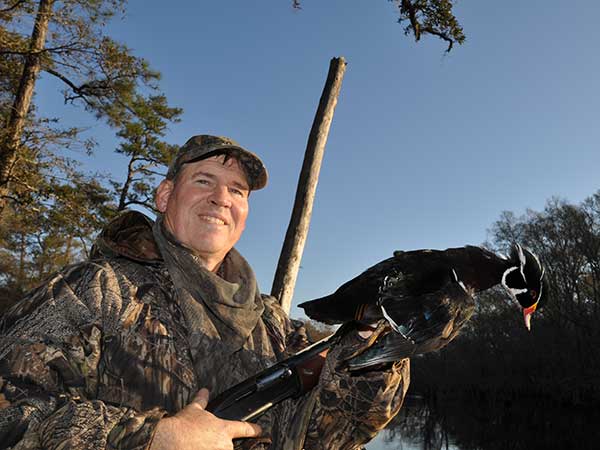 Ending North Carolina's blue law against Sunday hunting has been an uphill fight for years. The statute banning Sunday firearms hunting was enacted in 1868 during Reconstruction. About five years ago, Sunday hunting advocates noticed the law did not specifically ban archery gear for hunting and urged the N.C. Wildlife Resources Commission to allow bow and crossbow hunting. The legislature did not intervene and falconry hunting was eventually included for the same reason. Military bases could already allow Sunday firearms hunting at their discretion.
Ending North Carolina's blue law against Sunday hunting has been an uphill fight for years. The statute banning Sunday firearms hunting was enacted in 1868 during Reconstruction. About five years ago, Sunday hunting advocates noticed the law did not specifically ban archery gear for hunting and urged the N.C. Wildlife Resources Commission to allow bow and crossbow hunting. The legislature did not intervene and falconry hunting was eventually included for the same reason. Military bases could already allow Sunday firearms hunting at their discretion.
In the years since, a hardcore group of hunters never gave up the battle, even with their fellow hunters who disagreed with Sunday hunting. In lengthy, late-night debate on April 28, 2015, the Outdoor Heritage Act, H640, passed the N.C. House with a vote of 83 to 35, just in time to meet a crossover deadline to the Senate.
Primary sponsors were Jimmy Dixon (Wayne, Duplin), Marvin Lucas (Cumberland), Chris Malone (Wake) and Michele Presnell (Haywood Madison, Yancey). The Senate eventually passed a similar version, but with greater restrictions on distances and hours with reference to places of worship. The two branches eventually agreed on a final bill in conference and ratified it on June 29, 2015. Governor Pat McCrory signed the bill into law (S.L 2015-144) on July 8, 2015.
Rep. Dixon drafted the original bill. Speaking with county commissioners, poultry growers, Eastern Band of the Cherokee, Blue Ridge Parkway Association, Horse Council, Christian Action League, hound-hunting groups and other stakeholders, he revised the wording repeatedly to address concerns. Besides listening to Sunday gun hunting advocates, he identified the other stakeholders' desires for positive provisions, included expansion of youth opportunities for hiking, horseback riding, boating, sport shooting, archery, bird-and-wildlife watching, camping swimming, hunting, trapping and fishing.
The law expands public access by encouraging the NCWRC to open game lands for hiking, horseback riding, boating, wildlife watching, swimming camping and other outdoor recreation where feasible. It increases penalties for wildlife violations. It also initiates a $2 check-off donation during N.C. Wildlife Resources Commission license transactions to pay for these youth programs and establishes an 11-member Outdoor Heritage Advisory Council.
The law continues imposing restrictions on Sunday firearms hunting. The most severe are that it only applies to private property, no one may hunt between 9:30 a.m. and 12:30 p.m. or within 500 yards of a house of worship or any residence that they do not own.
"The Senate didn't want to allow hunting with a firearm before 12:00 noon on Sunday," Dixon said. "I felt that was too restrictive and worked out the compromise of excluding hunting from 9:30 to 12:30 out of sensitivity to the rural churches as that time will generally cover church activities on Sunday. There is no time restriction for preserves that are no closer than 500 yards from a church or residence not owned by the preserve."
The law continues to ban hound-hunting deer with firearms on Sunday and Dixon said it was due to the length of the chase. Wake and Mecklenburg were exempt due to populations that exceed 700,000 people. Other counties will be able to prohibit Sunday hunting after two years.
Another exception applies to migratory game birds. When the pro-Sunday hunting movement began gathering steam in North Carolina and other blue law states in the 1990s, the USFWS granted compensatory days for the loss of hunting on Sundays so the total number of days in any waterfowl season would be the same as allowed within the federal framework for states who allowed hunting on Sundays. However, the USFWS did not allow compensatory days for other migratory game bird seasons, including woodcock, dove, snipe and rail, so those days have always been lost to hunters. A thin majority (approximately 52 percent according to Delta Waterfowl) of waterfowl hunters that said they hunt primarily public waters opposed Sunday gun hunting if it would only apply to private land because they would essentially lose those compensatory days. In the end, that is what prevented all hunters from being able to hunt any migratory game birds on Sunday.
While South Carolina prohibits Sunday hunting on public lands, it allows hunting on public waters. A similar amendment to North Carolina's law would resolve this conflict for North Carolina's migratory game bird hunters. Forty states have no restrictions on Sunday hunting, whether on private or public lands and waters.
Other sections of the law increase the weight of a cub bear from 50 pounds to 75 pounds for harvest definition purposes and prohibit hunting foxes with hounds at Bladen Lakes Game Land from April 1 through August 1. It also requires wildlife enforcement officers to wear body cameras and exempts landowners from civil liability for granting permission to hunters to retrieve their hunting dogs.
To read the Outdoor Heritage Act, visit the North Carolina Legislature website (http://www.ncleg.net/gascripts/BillLookUp/BillLookUp.pl?Session=2015&;BillID=H640&submitButton=Go).
